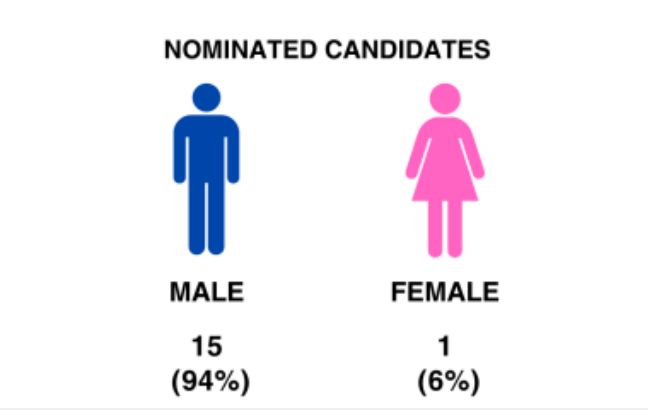By Elections Reveal Troubling decline in Women’s Political Participation in Zimbabwe
Jacqueline Ndlovu

Only one out of 16 candidates that contested in the recent 3 February 2024 by-elections was a woman, sparking alarm over declining female political participation and voter apathy. This stark outcome, with six male MPs elected across six constituencies namely Chegutu West (Mashonaland West), Goromonzi South (Mashonaland East), Mkoba North (Midlands), Pelandaba-Tshabalala (Bulawayo Metropolitan Province), Seke (Mashonaland East), and Zvimba East (Mashonaland West) constituencies, highlights a troubling trend. The seats became vacant due to the recalls of the MPs who represented the CCC on November 13, 2023.
This all-male outcome echoes observations by the Election Resource Centre (ERC) Report, highlighting a continued decline in women’s political participation. “Of the 16 nominated candidates in the 3 February By-elections, only one was female representing 6% of total nominations. Down from the 12.9% from the 9 December 2023 by-elections and 11% from the 23/24 August 2024 Harmonised elections respectively.” This trend raises critical questions about the repercussions for women’s future electoral engagement. Aspiring female candidates like Nomalanga Ncube and Sinanzeni Gumede expressed discouragement, citing the perception reinforced by these results that politics remains a male-dominated arena.
“Seeing no women elected has discouraged me and other aspiring female candidates, fostering a perception that politics remains a male-dominated domain. This self-fulfilling prophecy can further entrench the underrepresentation of women in parliament. This makes us question the real reason for the Tshabangu recalls,” Nomalanga Ncube from Tshabalala. The absence of women in parliament risks overlooking critical issues that disproportionately affect them, such as healthcare, education, and gender-based violence. This lack of representation can further marginalize women’s voices and concerns. This has further overturned the strides made to have gender parity,” Sinanzeni Gumede said.
ERC reports that voter turnout across the by-elections averaged a low of 23.2%, with a significant urban-rural divide (13.6% vs. 36.3%). Noting a staggering 48.6% drop in turnout compared to the 2023 Harmonised elections. The ERC attributes this apathy to factors like perceived disregard for voter choice by political parties, candidate disqualifications, and a breakdown in trust between the Zimbabwe Electoral Commission (ZEC) and the electorate.
Commendably the ERC reports that 50% of presiding officers and 57.1% of electoral officers were female. However, this statistic doesn’t address the crucial lack of female candidates and elected officials. The by-election results highlight the need for urgent action to address the declining representation of women in Zimbabwean politics. This includes tackling structural barriers to female participation, fostering trust in electoral processes, and empowering women to run for office. Only then can Zimbabwe strive towards genuine inclusivity and responsiveness to the needs of all its citizens.
